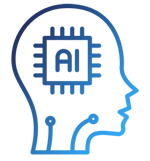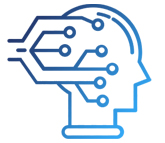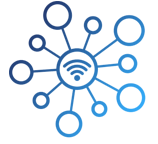- AI

Artificial Intelligence

Smart Products & Services
We follow Smart Products & Services

Intelligent Business Functions & Processes
We follow Intelligent Business Functions & Processes

Robotic Process Automation
We follow Robotic Process Automation

Personalized
healthcareWe follow Personalized healthcare

Identifying at-risk patients
We follow Identifying at-risk patients

Optimized routing and scheduling
We follow Optimized routing and scheduling
- ML

Machine Learning

Predictive
AnalyticsWe follow Predictive Analytics

Service Personalization
We follow Service Personalization

NLP
We follow NLP (Natural Language Processing)

Stock Market Forecasting
We follow Stock Market Forecasting

Fraud Prevention
We follow Fraud Prevention

Recommender engines
We follow Recommender engines
- blockchain
- IOT

Internet of Things
- AR
- Business Solutions

Business Solution

Business Performance Management
We follow Business Performance Management

Decision Making & Big Data Analytics
We follow Decision Making & Big Data Analytics

Enterprise Data Management
We follow Enterprise Data Management
- Apps

Apps

Native Apps
We follow Native Apps

Cross Platform Apps
We follow Cross Platform Apps

Web Apps
We follow Web Apps

Hybrid Apps
We follow Hybrid Apps

Cloud Native Apps
We follow Cloud Native Apps
- Lab

Navigating the World of IoT Technology Strategy
In the rapidly evolving digital transformation landscape, organisations are increasingly adopting cutting-edge technologies such as the Internet of Things (IoT) and Artificial Intelligence (AI) to enhance operational efficiency and achieve business growth. According to Statista, the number of Internet of Things (IoT) devices worldwide is forecast to almost triple from 9.7 billion in 2020 to more than 29 billion IoT devices in 2030. In 2030, the highest number of IoT devices will be found in China with around 5 billion consumer devices.
This article serves as a comprehensive guide to understanding IoT technology strategy, and the role of IoT consulting by AI companies in the United Kingdom.
Understanding IoT Technology Strategy
IoT technology strategy refers to the framework and approach used by businesses to effectively leverage the potential of IoT solutions within their operations. It involves identifying business objectives, evaluating IoT use cases, selecting suitable IoT devices and platforms, and integrating them into existing systems. A well-defined IoT technology strategy can enable businesses to optimise processes, improve decision-making, enhance customer experiences, and drive innovation.
The Role of IoT Consulting

Implementing IoT solutions can be complex, requiring expertise in various domains such as hardware, software, connectivity, security, and data management. This is where IoT consulting comes into play. IoT consultants possess specialised knowledge and experience in designing, deploying, and managing IoT ecosystems. They help organisations assess their IoT readiness, develop a tailored strategy, select appropriate vendors and technologies, and provide guidance throughout the implementation process. IoT consulting firms provide invaluable insights and ensure a smooth transition to an IoT-enabled environment.
Benefits of IoT Technology Strategy and IoT Consulting

-
Enhanced Operational Efficiency:
Implementing IoT technology strategy enables businesses to streamline processes, automate tasks, and improve overall operational efficiency. IoT devices can collect real-time data, monitor equipment performance, and trigger automatic actions, reducing manual intervention and minimizing downtime. This leads to optimised resource allocation, improved productivity, and cost savings.
-
Data-Driven Decision Making:
IoT solutions generate a vast amount of data that can be analysed to gain valuable insights. With IoT technology strategy, organisations can leverage data analytics and AI algorithms to make informed decisions. Real-time data analytics provide actionable intelligence, enabling businesses to identify trends, patterns, and potential issues, leading to proactive decision-making and improved business outcomes.
-
Enhanced Customer Experiences:
IoT technology allows organisations to deliver personalised and seamless customer experiences. By collecting data on customer behavior and preferences, businesses can offer tailored products, services, and recommendations. IoT-enabled devices can also enable proactive maintenance and remote monitoring, ensuring uninterrupted services and enhancing customer satisfaction.
-
Improved Safety and Security:
IoT technology strategy plays a crucial role in enhancing safety and security across various industries. For instance, in manufacturing environments, IoT devices can monitor equipment conditions, detect anomalies, and trigger alarms or shutdowns in case of potential hazards. In addition, IoT solutions can provide robust security measures to protect sensitive data and prevent unauthorised access, safeguarding the integrity of systems and networks.
-
Cost Savings and Resource Optimisation:
IoT technology enables businesses to optimise resource utilization and reduce costs. By monitoring energy consumption, organisations can identify energy-saving opportunities and implement efficient practices. IoT devices can also facilitate predictive maintenance, reducing unexpected breakdowns and minimizing repair costs. Additionally, automated processes and remote monitoring can eliminate the need for physical presence, saving time and travel expenses.
-
Scalability and Flexibility:
IoT technology offers scalability, allowing businesses to expand their IoT networks as needed. Whether it’s adding new devices, integrating additional sensors, or connecting more systems, IoT solutions can accommodate growth seamlessly. This scalability enables organisations to adapt to changing business requirements and embrace new opportunities quickly.
-
Competitive Advantage:
Adopting IoT technology strategy and leveraging IoT consulting can provide organisations with a competitive edge. By harnessing the power of IoT, businesses can differentiate themselves in the market by offering innovative products, services, and experiences. IoT-enabled insights and automation can lead to faster time-to-market, improved customer satisfaction, and increased market share.
-
Sustainable Practices:
IoT technology can contribute to sustainability efforts by optimising resource consumption and reducing waste. Smart energy management systems, for example, can monitor energy usage, detect inefficiencies, and implement energy-saving measures. IoT-enabled supply chain management can also help organisations track and reduce their environmental impact by optimising logistics and reducing emissions.
-
Industry-Specific Benefits:
IoT technology strategy offers industry-specific benefits across various sectors. In healthcare, IoT devices enable remote patient monitoring, telemedicine, and real-time health data analysis, leading to improved patient outcomes and cost-effective healthcare delivery. In agriculture, IoT solutions can optimise irrigation, monitor soil conditions, and enhance crop yields. In logistics, IoT technology facilitates asset tracking, route optimisation, and inventory management, improving efficiency and reducing costs.
-
Predictive Maintenance:
IoT technology enables predictive maintenance, which helps organisations identify potential equipment failures before they occur. By leveraging real-time data and analytics, businesses can detect anomalies, monitor equipment performance, and schedule maintenance proactively. This approach reduces unplanned downtime, extends equipment lifespan, and optimises maintenance costs.
-
Supply Chain Optimisation:
 IoT solutions play a crucial role in optimising supply chain operations. By incorporating IoT devices, businesses can track shipments in real-time, monitor inventory levels, and automate inventory replenishment. This streamlines the supply chain process, reduces stockouts, minimises holding costs, and enhances overall supply chain efficiency.
IoT solutions play a crucial role in optimising supply chain operations. By incorporating IoT devices, businesses can track shipments in real-time, monitor inventory levels, and automate inventory replenishment. This streamlines the supply chain process, reduces stockouts, minimises holding costs, and enhances overall supply chain efficiency. -
Remote Monitoring and Control:
IoT technology allows businesses to remotely monitor and control devices and systems from anywhere, at any time. This remote accessibility enables real-time visibility into operations, facilitates quick decision-making, and offers greater control over critical processes. For example, remote monitoring of energy consumption allows businesses to identify wastage and implement energy-saving measures.
-
Improved Quality Control:
IoT devices can be utilised to monitor and track product quality throughout the production and distribution processes. Sensors and connected devices can capture data on temperature, humidity, pressure, and other relevant parameters to ensure adherence to quality standards. Real-time monitoring enables prompt intervention, reduces defects, and enhances product quality.
-
Enhanced Asset Tracking:
IoT technology provides robust asset tracking capabilities, particularly in industries with valuable or high-risk assets. By attaching IoT-enabled trackers to assets, businesses can monitor their location, condition, and utilization in real time. This facilitates efficient asset management, reduces loss or theft, and enables timely maintenance or replacement.
-
Regulatory Compliance:
IoT technology can assist organisations in meeting regulatory compliance requirements more effectively. IoT devices can monitor and record data related to environmental conditions, safety protocols, and operational parameters. This data can be easily accessed for auditing purposes, ensuring compliance with industry standards and regulations.
-
Customer Insights and Personalization:
IoT technology enables businesses to gather valuable customer data, allowing them to gain deeper insights into customer behaviour, preferences, and needs. This data can be leveraged to personalise marketing campaigns, develop targeted offerings, and enhance the overall customer experience. With IoT technology, businesses can build stronger customer relationships and foster brand loyalty.
-
Remote Asset Management:
IoT technology enables businesses to remotely manage and control assets located in different geographical locations. This is particularly beneficial for organisations with widespread operations or assets in remote areas. Remote asset management reduces the need for physical visits, minimises maintenance costs, and ensures prompt response to issues.
-
Improved Energy Efficiency:
IoT technology can significantly contribute to energy conservation efforts. By deploying smart sensors and connected devices, organisations can monitor and optimise energy consumption across various systems and processes. Real-time data analytics enables the identification of energy inefficiencies, enabling businesses to implement energy-saving measures and reduce their carbon footprint.
-
Collaborative Innovation:
IoT technology fosters collaborative innovation by facilitating the exchange of data and insights between different stakeholders. By connecting devices, systems, and platforms, organisations can share data securely, collaborate on projects, and develop innovative solutions collectively. This collaborative approach accelerates innovation cycles, promotes knowledge sharing, and drives industry-wide advancements.
-
New Business Models:
IoT technology opens up opportunities for new business models and revenue streams. With IoT-enabled solutions, organisations can shift from traditional product-centric models to service-oriented models. For example, companies can offer value-added services based on real-time data, such as predictive maintenance services or pay-per-use models. This allows businesses to create new revenue streams and establish long-term customer relationships.
The implementation of IoT technology strategy and the utilization of IoT consulting services offer numerous benefits to organisations across industries. From enhanced operational efficiency and data-driven decision-making to improved customer experiences and cost savings, IoT empowers businesses to thrive in the digital era. By embracing IoT and leveraging the expertise of IoT consulting firms, organisations can unlock new levels of innovation, competitiveness, and sustainability. As the UK continues to foster an ecosystem of AI companies, the synergy between IoT and AI technologies further amplifies the potential for transformative solutions and business growth. Embracing IoT technology strategy is not only a necessity in today’s rapidly evolving landscape but also a strategic imperative for organisations seeking to stay ahead of the curve and drive meaningful impact.
Conclusion
The convergence of IoT and AI technologies presents unprecedented opportunities for organisations to revolutionise their operations and create innovative solutions. Understanding IoT technology strategy and leveraging the expertise of IoT consulting firms can help businesses navigate the complexities of IoT implementation successfully. Additionally, exploring the vibrant AI ecosystem in the UK can uncover potential partnerships and collaborations with leading AI companies. By embracing these transformative technologies, businesses can stay ahead in the digital era and unlock new levels of growth and efficiency. Furthermore, if you are looking for AI companies in the UK, then get in touch with Sky Potential.



















































Leave a Reply